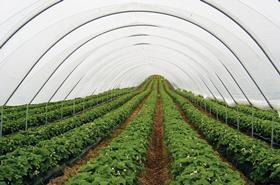
When Herefordshire Council recently granted permission for a local grower to build polytunnels in the Wye Valley area, his request was ultimately rejected by a judicial review at London’s High Court.
Soft-fruit grower Neil Cockburn, of Pennoxstone Farm, said that the decision, made in April, could put him out of business. His views were countered by the Wye Valley Action Association (WVAA), which claimed the structures would have ruined an area of outstanding natural beauty.
This sort of situation is becoming all too common for British growers, according to David Higginbottom of Polytunnels UK. He explains: “Supermarket sales of British-grown berries have increased by 130 per cent in the last four years, and this is largely down to polytunnels.”
Higginbottom fears that the UK market for strawberries and raspberries is at risk of not being able to meet demand due to increasing moves being made to prevent the use of polytunnels.
He adds: “One of the most common misconceptions about polytunnels for berry growing is that they are taking over the countryside when in fact they account for only 0.01 per cent of our agricultural land as a whole.”
His views are echoed by Kevin Williams, who owns Isle-of-Wight based polytunnel business J&K Polyculture. “Where would we have been without polytunnels last summer?” he asks. “Without the big supplies of strawberries and raspberries, the poor weather would have resulted in an even more disastrous year for the UK’s fresh produce industry.”
Meanwhile, Les Lane of XL Horticulture says that there should be a greater focus on the innovation, rather than controversy, within the polytunnels industry. “We are now producing films which have a 10-year lifespan for growers, and side vent nets allowing up to four times as much air into polytunnels to help replicate natural conditions while protecting crops from the weather,” explains Lane, whose business will celebrate its 20th anniversary this year.
According to the National Farmers Union, more than 90 per cent of British-grown strawberries are produced under polytunnels, with the strawberry industry worth around £400 million every year.
Philip Hudson, head of food and farming at the NFU, says it is imperative to food security that the growth of the soft-fruit industry isn’t halted by lobbyists.
He concludes: “Polytunnels have extended the soft-fruit growing season from 12 weeks a year to six months, reducing the need for imports.
“They are going to become even more important as the UK seeks to ensure its foodsecurity and produce more home-grown produce.” —



